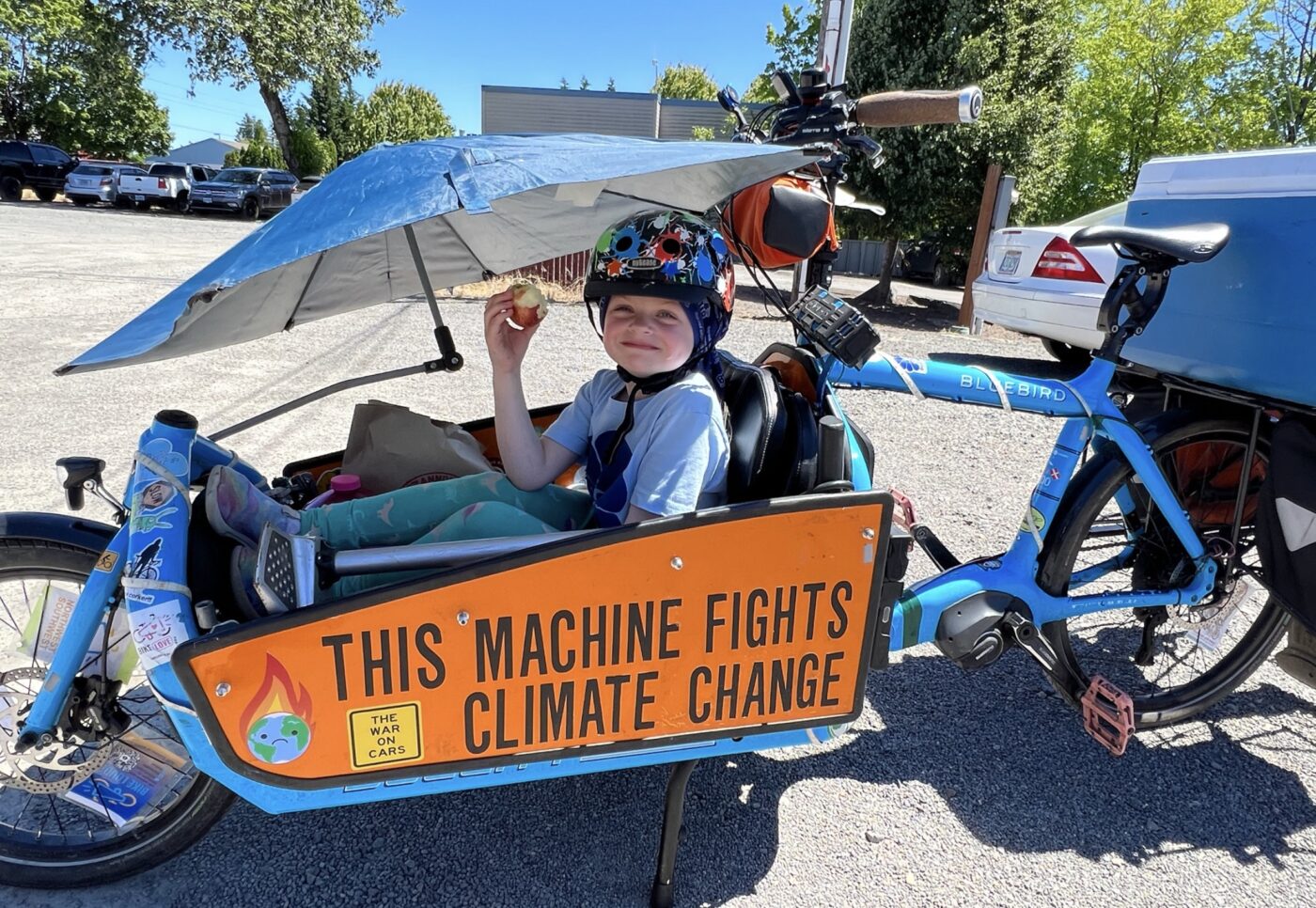
— by Family Biking Columnist Shannon Johnson. She previously wrote about when summer bike adventures go awry.
I’ve recently been reflecting on why I started biking with my children, and how we have evolved as a biking family over the last three-and-a-half years. Biking has improved our lives and also prompted us to change our lives, a process that continues as we grow as a family that rides. Today, we bike for many more reasons than when we started. I often think, “the more we bike, the more reasons we discover for doing so!”
As I was mulling over our own family’s biking journey, I asked some other local biking families to share their stories:
“Why do you bike as a family?” and “Have those reasons changed over time?”
A common thread immediately emerged in the answers I received: Local families who took up biking as their personal contribution to fight against climate change. While this was not the reason I started biking, I found these family bike stories to be edifying, as members of the community explained their personal commitment and major lifestyle changes to fight for a healthier environment for their children and future generations.
I hope you are as encouraged to read their stories as I was. Please feel free to share your own story in the comments, or email me longer answers at shannon4bikportland@gmail.com (If you email me your own family biking story for possible publication, please include a photo of your family biking.)
Rachel Philip
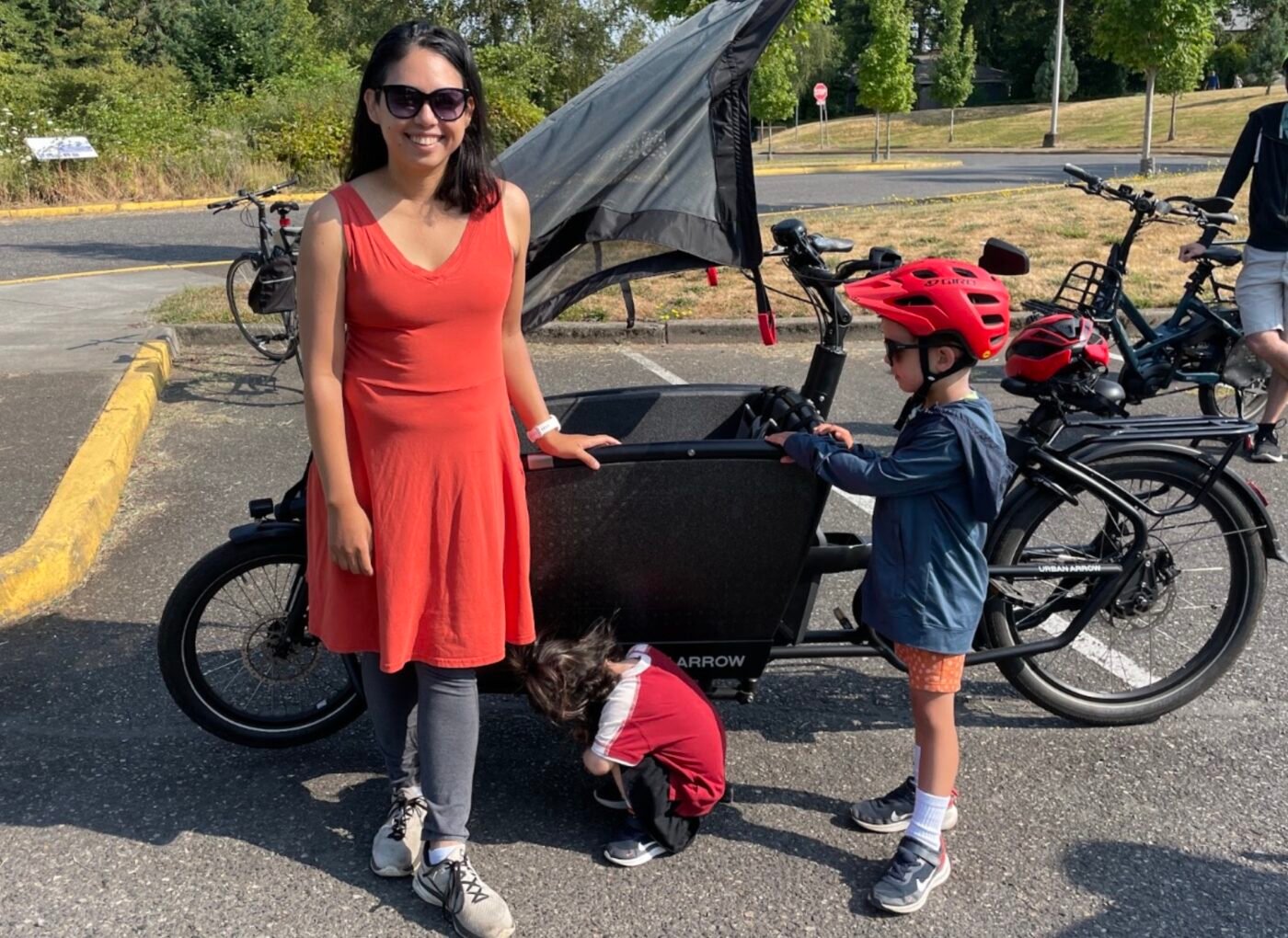
Our original “why” for biking as a family was that we don’t want our kids to live in a climate change hellscape, so we ought to act like part of the solution by riding our bikes rather than driving. One year in, that’s still a big part of the reason (and what gets me on the bike when the weather is particularly crummy or I’m not feeling my best).
But another reason we’ve stayed with it is because we love it. We have a five and two-year old, and they will both complain and sometimes cry when we take the car to school. The quality of time we spend together on our bike ride to school is a lot nicer than it is in the car. We get to see nature, our neighbors’ yards, and count dogs, garbage trucks, and school buses. We know where all the flamingo lawn decorations are. We’ve spotted a rabbit running around free in a particular neighborhood. Lately my kids have taken to screaming with joy on the big downhill part of our ride to daycare. The screams are not joyful in the car.
We don’t want our kids to live in a climate change hellscape, so we ought to act like part of the solution by riding our bikes rather than driving.
Our biking mission statement has been, if we think we can bike to a destination relatively safely, we will. We’re still getting in the car for events in neighboring cities and Costco trips. But, we do skew to more local and “bike friendly” destinations as a family. There are several cool parks that we just don’t visit as much anymore because we aren’t comfortable biking to them. On the flip side, getting the kids loaded up into the bike and going to the parks that are on safer routes feels like much less of a burden than getting into the car, and we go to them much more frequently.
James Schiffer
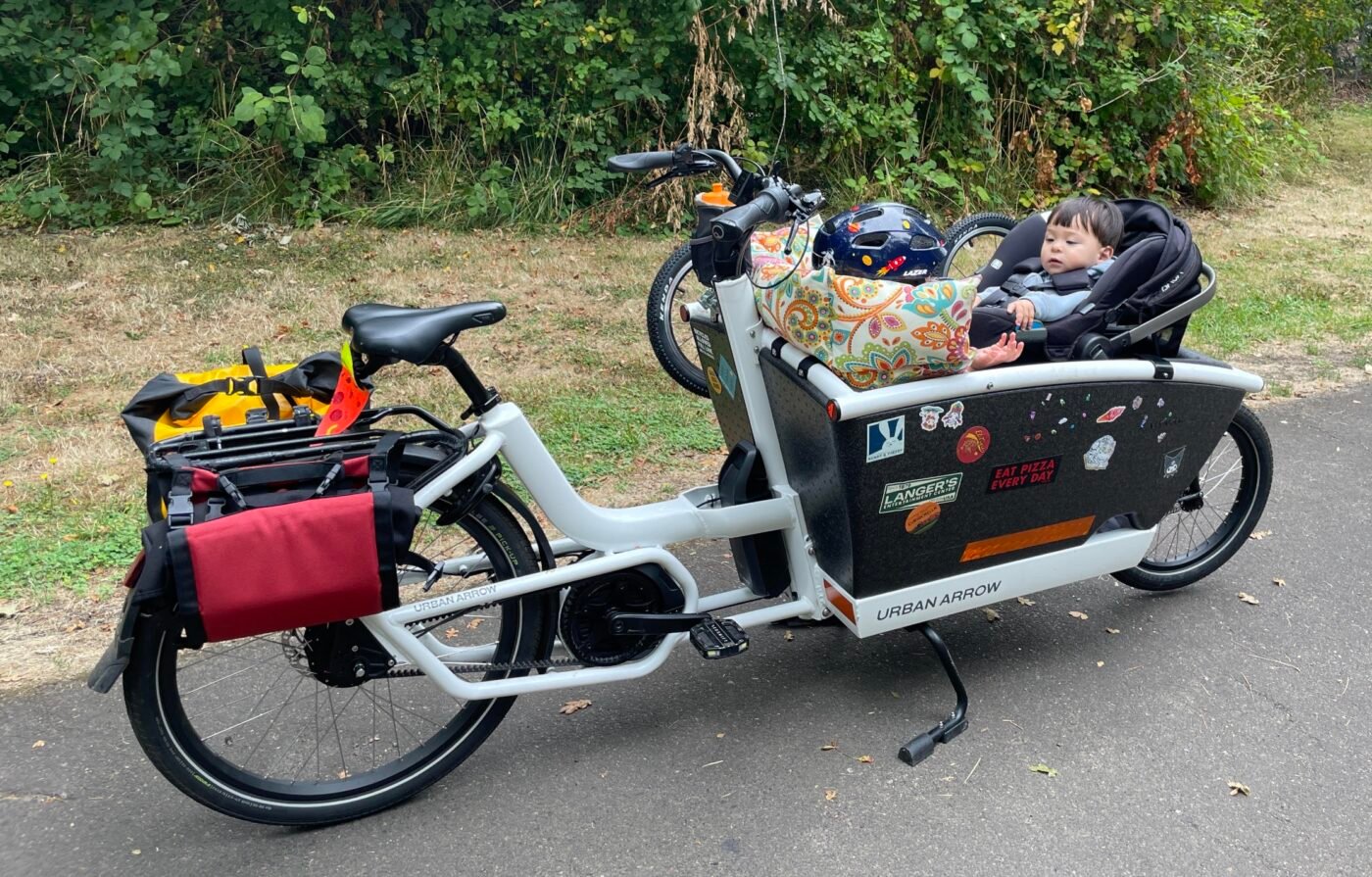
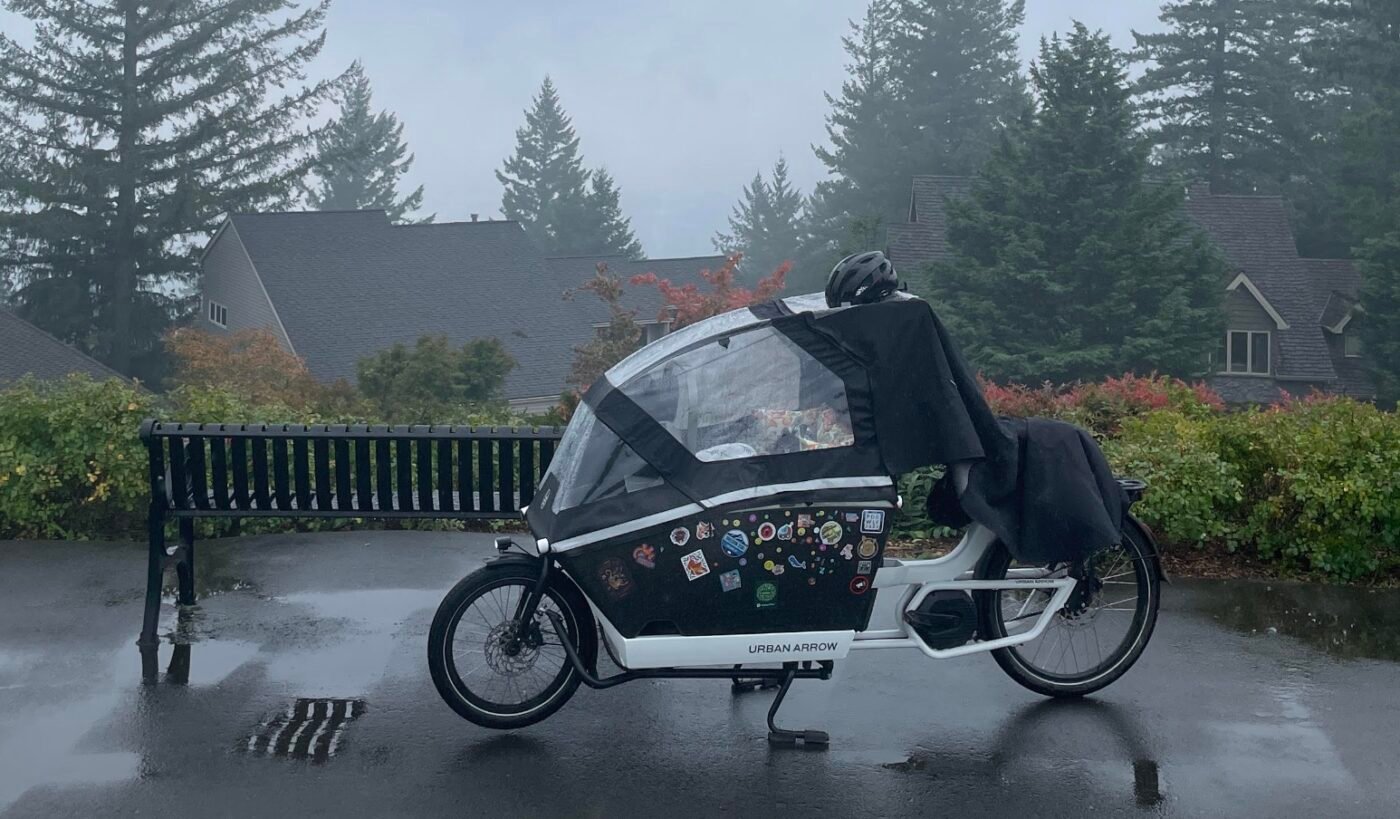
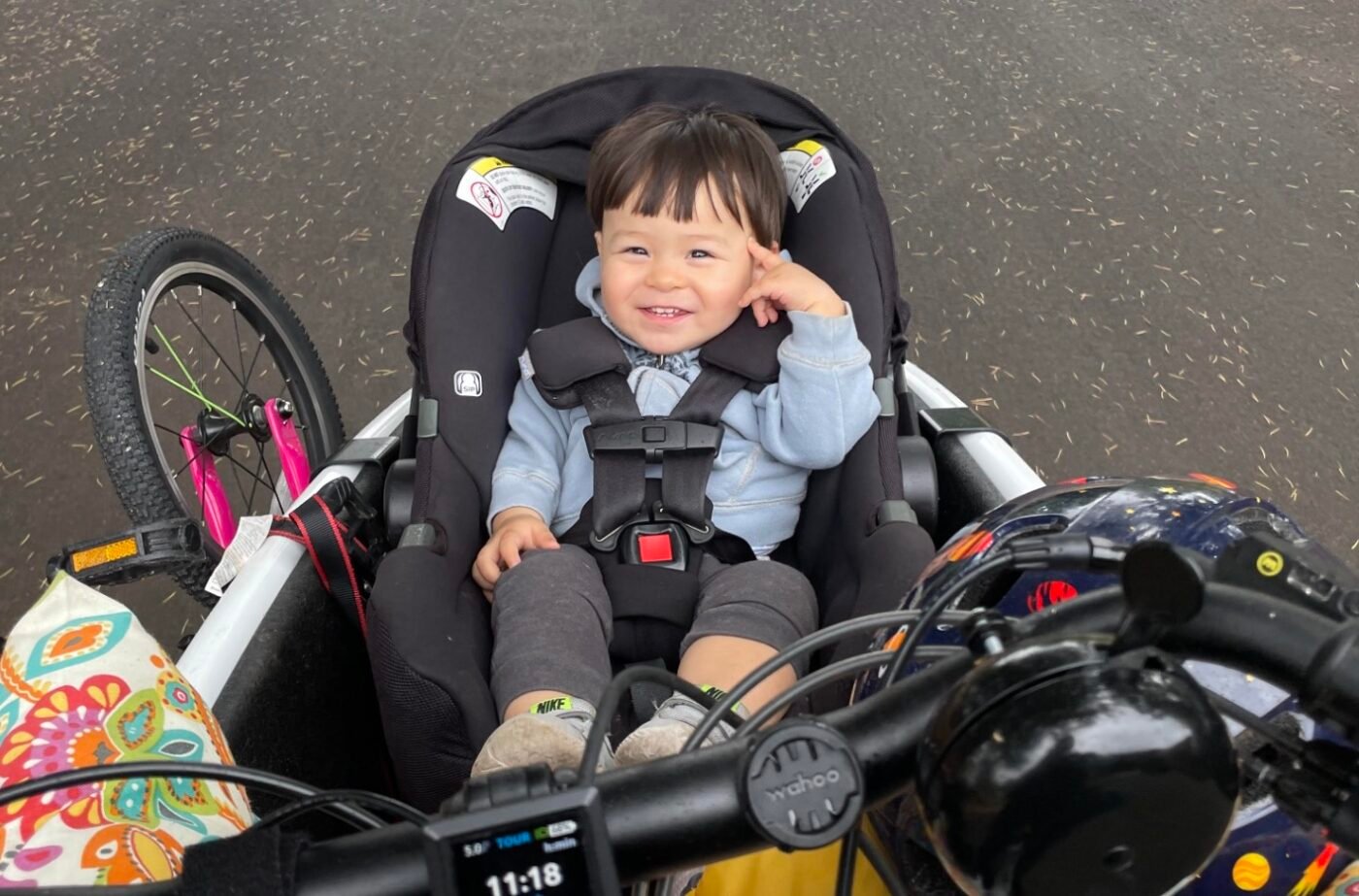
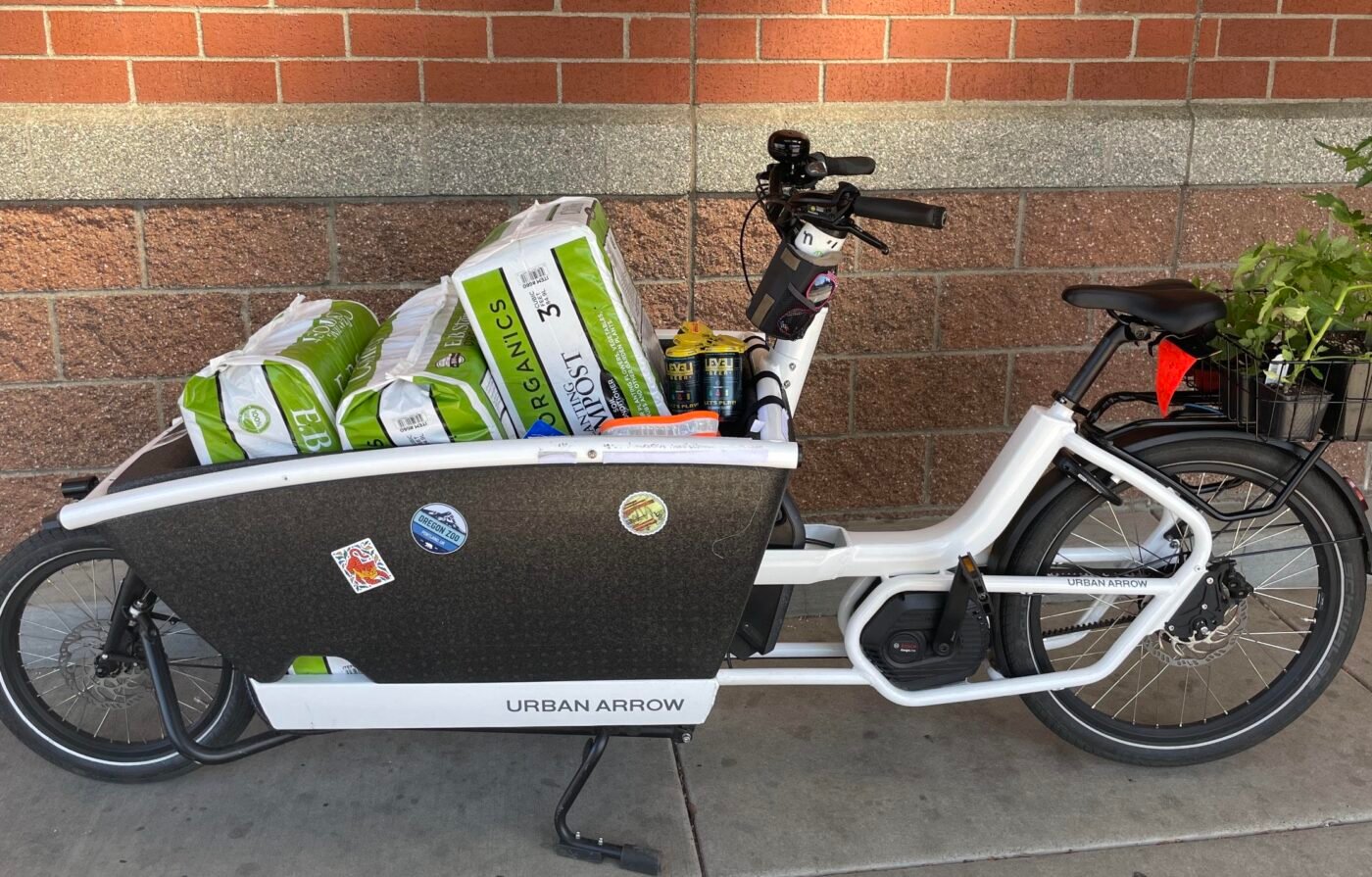
First and foremost for the memories. It is hard to convey the value of these memories in writing. Don’t get me wrong – we do drive a car around as a family and have memories doing so. But for numerous reasons riding a bike generates amazing memories at a much higher rate than driving a car. I think this is because I am generally more happy / less stressed while riding a bicycle. Maybe for some it is fine, but I find driving around cities and suburbs puts me more on edge and drains an outsized amount of mental energy due to traffic, parking, and risk. I think my kids and certainly my wife pick up on that and it ends up coloring those outings. There are still issues with biking places, but the consequences are so much less and in general it feels more relaxed and fun to me.
The bicycle is a very humble and simple machine that cracks wide open the world around us
Secondly it is to teach my children practical skills that facilitate a love for life and independence. A sense of direction, assessing risk and reward, problem solving, value of preparation, and most of all that feeling of wind and speed. My 4 year old daughter can lead the way to every single daily or weekly destination near our home on her 16” pedal bike. She plays imagination games or shows me her “tricks” while doing so, grinning from ear to ear. Having a bakfiets that can carry our 1 year old son, her, and her bicycle helps immensely and removes negative experiences. I think it won’t be long before she will be able to outride me if it keeps her interest. The bicycle is a very humble and simple machine that cracks wide open the world around us. Given a sweet potato and a bike, it’s amazing how far one can get. No matter how much or little they choose to engage with it long term, I know they will get a good return on their investment of time and energy.
Thirdly, it’s socially responsible transportation. I had always avoided thinking about the state of the world and humanities future too much just because it was always so depressing. Having children made me face the future and the numerous ethical dilemmas of my actions and lifestyle. I can’t just raise them continuing on with all the same shortsighted behavior and expect them to fix everything when they inherit the earth. It’s amazing the number of looming existential threats that can be helped by simply not driving to places less than 3 miles away: climate change, housing crisis, obesity, depression, etc. Yeah, there is still a lot of other stuff to do – but biking is easy low hanging fruit.
It was initially first and foremost about climate change. As we rode, I realized just how much I cherished those experiences and how much different going out felt. What started as a “Don’t drive to places less than 3 miles away” as a restriction on my lifestyle has evolved into the preferred and default option. Some of that might be how easy the bakfiets make day to day tasks like family grocery or home depot runs. I have especially loved the Urban Arrow rain solution. It can be raining cats and dogs and we will all be comfortable and dry through hour-long rides. Good wet weather solutions turn trips by bike into the best option year round.
Shawne Martinez
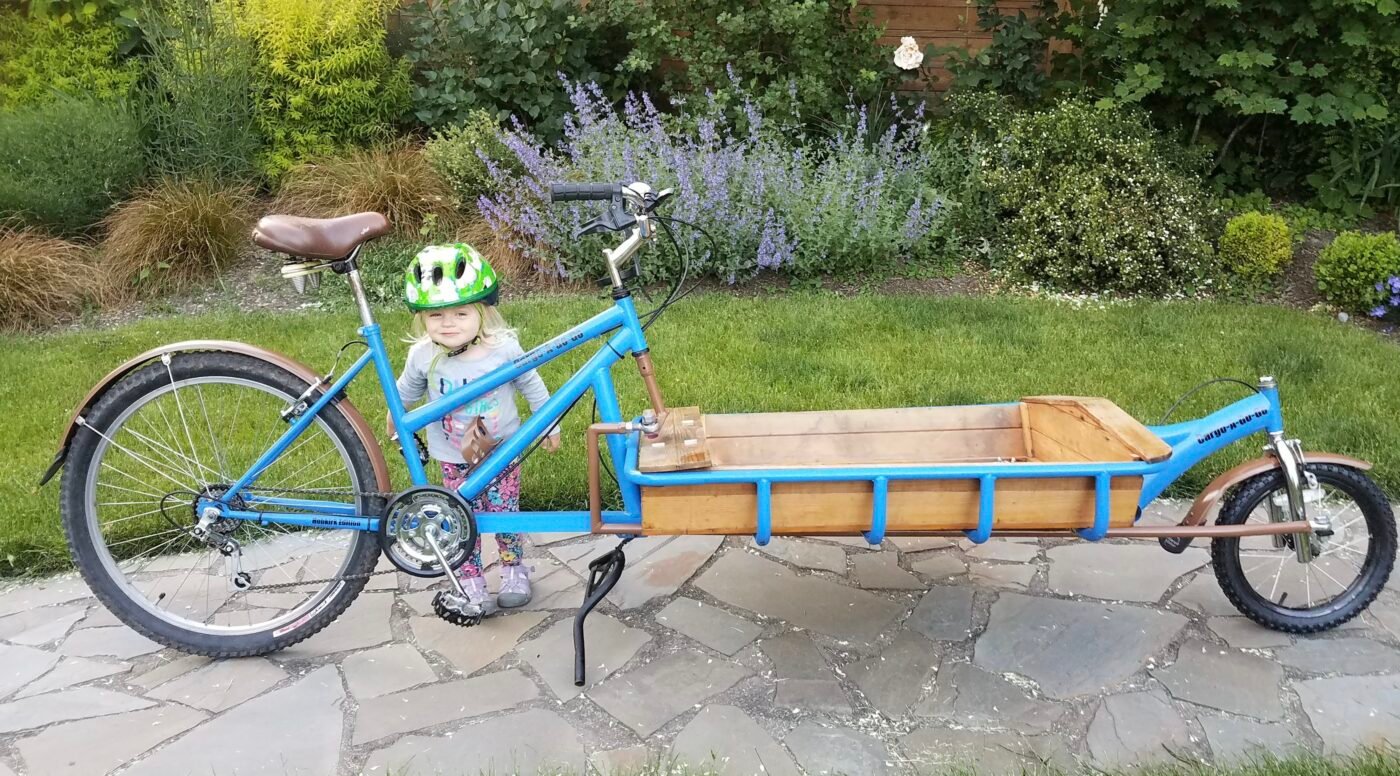
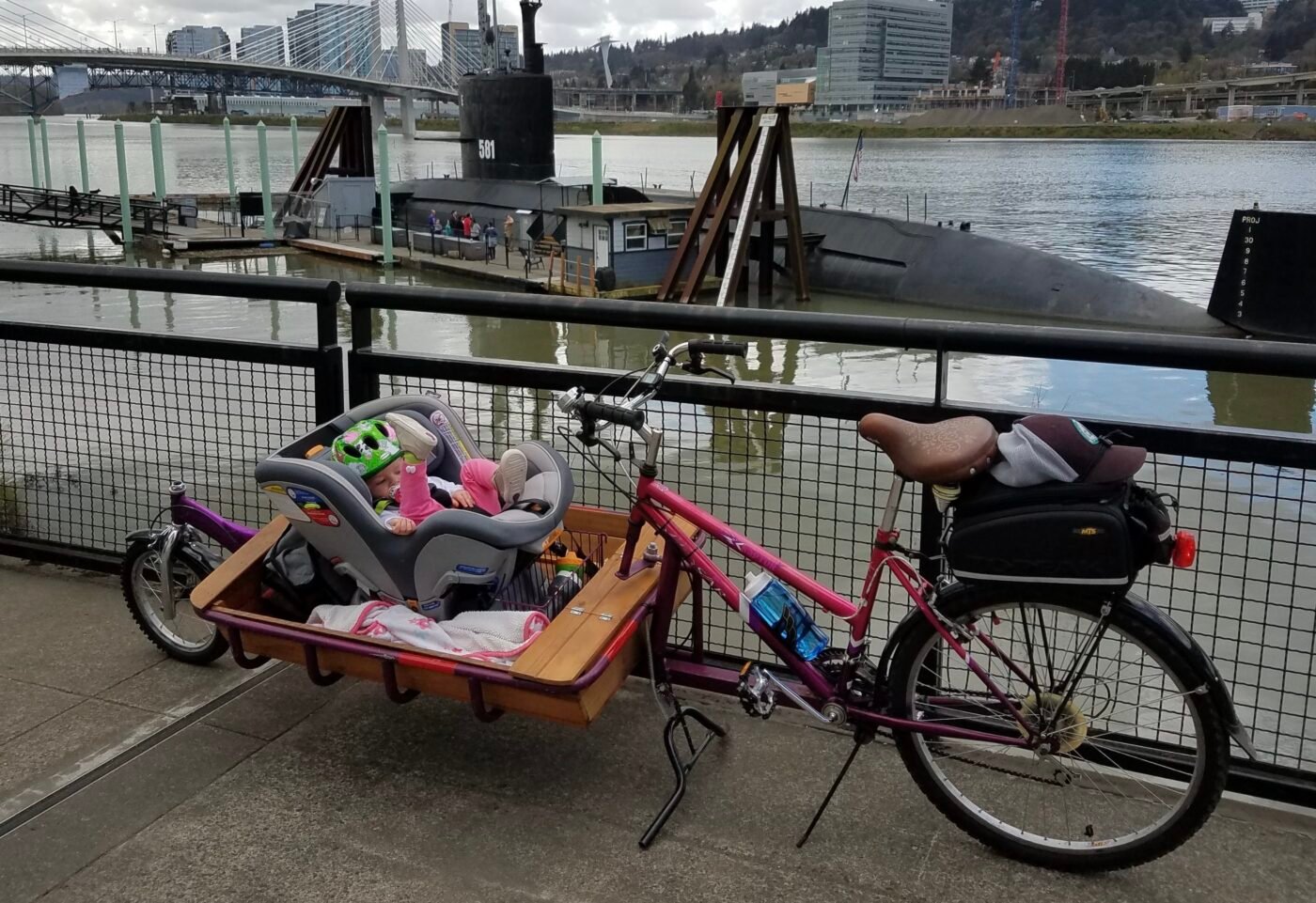
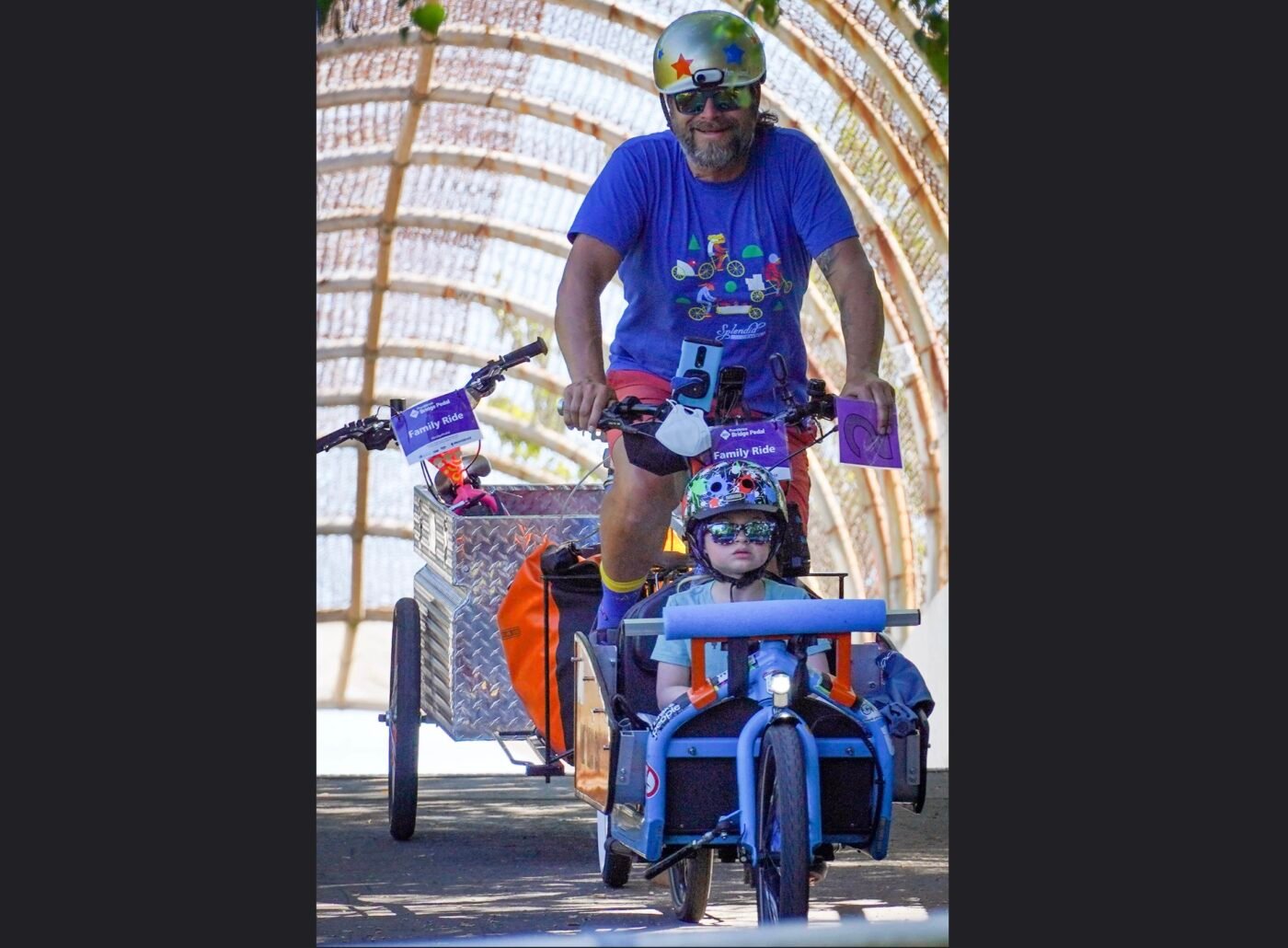
The main reason that I am car-free is so that when the effects of climate change are so extreme that they can no longer be ignored by most people, my daughter will know that I did everything in my power to reduce the burden that our choices have created for her and her generation. 40% or Oregon’s greenhouse gas emissions are from the transportation sector. Reducing or eliminating car trips is something that we all can do immediately to reduce the effects of climate change.
I like to say that the first step in my “radicalization” of being car free was just after my daughter was born and I was trying to push a stroller through our neighborhood with no sidewalks or bike lanes. We had to walk and roll in the car lanes everywhere we went which made me realize how dangerous our infrastructure is for people outside of cars.
Once I learned how terrible diesel emissions are (for children in particular) I felt extreme guilt for driving the pickup truck that I had been driving for years as a commuter vehicle.
Once I learned how terrible diesel emissions are (for children in particular) I felt extreme guilt for driving the pickup truck that I had been driving for years as a commuter vehicle.
In 2016 I built my own bakfiets cargo bike by welding two bikes together in anticipation of participating in the Disaster Relief Trials in Portland. DRT opened my eyes to the cargo bike scene!
When the kiddo started preschool, I challenged myself to bike 10 miles each way to the Tualatin Hills Nature Center from Tigard. We rode on our homemade cargo bike as much as we could. Driving a big stinky diesel truck to a nature center seemed wrong and I wanted my daughter to have fond memories of biking to school. It turned out to be easier than anticipated so we didn’t drive much at all!
As my kiddo grew she was getting heavier and I was getting older. Climbing the big hills home was getting tough. I decided to go all in and get an electric cargo bike. This purchase proved that I didn’t need a truck (or car) at all. Anything that exceeded the cargo bike’s capacity could be delivered for free or at a small cost. Any excuse that I could think of to not bike was shattered.
Soon after I sold the truck and went completely car-free. We’ve biked over 25,000 miles on cargo bikes and use public transit often. I’ve saved thousands of dollars over the years which can be put towards fun experiences instead of car payments and associated costs. We are happier and healthier without a car!






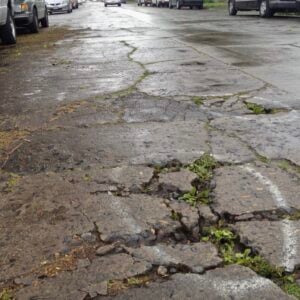
Thanks for reading.
BikePortland has served this community with independent community journalism since 2005. We rely on subscriptions from readers like you to survive. Your financial support is vital in keeping this valuable resource alive and well.
Please subscribe today to strengthen and expand our work.
Would love to see a coffee table photo book of 50 PDX cargo bike families in Powells.
Don’t tempt me with a good time.
I’ll buy the first copy!
I am sure you have a ton of cool ideas that would make this a classic. I bet some of the cargo bike companies would chip in for production costs.
I’d love to be able to spend time on projects like this but without anyone to keep the BP fire burning, it’s just impossible right now.
I would like to see the coffee table book of 50 carfree families, or households for that matter. How they do it? what their strategies and methods are? what they have to teach us about our assumptions?
This reminded me of the book “Material World: A Global Family Portrait,” which is fairly amazing in contrasting people’s “stuff”. It would be interesting to see how different families (successfully) get around, with less cars and more bikes.
Elly Blue, where are you!?!
We had no car for twenty years, including for the first eleven years of our daughter’s life. We used a Wee-Ride seat mounted to the top tube of my wife’s bike, a seat I made that attached to the rear rack*, and a variety of bike trailers.
Climate change, wanting nothing to do with automobility, the freedom and favorable economics of not owning a car all were motivations.
*https://bikeportland.org/2010/10/20/reader-diy-a-wooden-rack-mounted-child-seat-41342
Thanks for bringing that article up, nice bike seat! I do some woodworking and have been planning to make various luggage or other parts for my bikes. The only thing I made so far is a wooden adapter that mounts to the saddle rails to give a seat loops like on a Brooks saddle (basically a wooden one of these).
My next project, which I’m running out of time to work on, is a canopy for the bakfiets. It’ll have some frame parts made of wood.
I guess the seat worked despite the naysayers in the comments!
Ooh, please email me photos if you make your own DIY bakfiets canopy. I’d love to see what you come up with
That is such a cool seat!
I held off from making this comment to give people who are fans of this kind of story a chance to comment but I very strongly disagree that riding a bike fights climate change[sic].
Even if cycling mode share were to triple in Portland (extremely unlikely, unfortunately) any associated emissions reduction would be a rounding error:
40%*0.55*0.1=2.2%
(% transportation emissions*share low-occupancy “light” vehicle*10% cycling mode share.)
These calculation are also hopelessly optimistic given that Portland’s consumption-based transportation emissions are only 25% of the total — and as anyone who knows anything about urban GHG emissions it is consumption emissions that matter (not the lie-by-omission production emission metric).
Moreover, the reductive rhetoric of “lowering individual carbon footprints” by cycling serves to obscure our continuing societal failure to decrease GHG emission (e.g. well-off city dwellers can pat themselves on the back for riding bikes, recycling, and composting while continuing to support the climate arsonist Oregon democratic party).
Speaking for myself, it’s not so much that I think my individual actions have a significant effect on climate change. All you are saying may be true, I don’t doubt it. But it is my opinion that in a hypothetical future where we have actually got a handle on climate change, people will have to be doing things differently than they do today. Electric vehicles (cars) may be part of it, although the production of the vehicles themselves don’t go away.
In short, I don’t think “our way of getting around exactly the same as it is today, but with batteries” exists in a future where climate change is actually addressed. It will be something else.
Be that bikes, public transit, or something else I haven’t thought of, it will be a change. The only option I can see that actually works is public transit and bikes, and not going around by car everywhere (even electric). But to know if that is even possible, someone has to be doing it. I’m doing it as my own little proof of concept. “Look, see? You don’t need to drive everywhere and in fact it is pleasant not to.” Without people out doing it now (and even with people out doing it now), others will say it’s unrealistic to live without a car and driving everywhere.
Other things obviously have to change to address climate change (if it’s possible), but many of them just make the choice not to drive easier. Better transit, denser (more affordable / not profit driven) cities. Etc.
I think it’s great that you bike everywhere (though you still have your car, right?) but your demonstration that you can get around on your bike (most of the time) is probably not influencing a whole lot of others to start doing the same. I ride almost everywhere (that I don’t walk), but I can no longer pretend I’m saving the world, and I obviously haven’t started a movement.
What we most need is a ton of low-carbon energy. How much of that we use for transportation is a secondary question. Yes, if we need a bit less, our job will be a bit easier, but there is no possible way* we can rebuild Portland into a city where transit and bicycling can become primary modes of transportation in the next 30 years, especially when very few Portlanders want that future.
If you want to make a difference, start a company that can do something positive (ideally in the energy space), or work for a group that lobbies the government for regulations that can have have an impact at scale.
What you do in your personal life is nothing more than a hobby.
*All it will take to convince me there is a possible way is to explain how we overcome the political, economic, and environmental obstacles between us and that dream.
“your demonstration that you can get around on your bike (most of the time) is probably not influencing a whole lot of others to start doing the same.”
you, Watts, have no idea if that is true. Most of our transportation habits are emulative. Why do you think Priuses or once upon a time TDI Jettas were so popular in this town, compared to most other cities?
“What you do in your personal life is nothing more than a hobby.”
With friends like you pissing in our cheerios, who needs enemies?
”If you want to make a difference, start a company that can do something positive…”
Yes. A Capitalist! Capitalism is going to save us!
It’s the only thing that can have the necessary impact at scale.
Someone has to be first. There are still people on Portland who have never seen a cargo bike, much less conceived of using one to raise a family.
Capitalism has huge leverage but this week capitalism is not giving us images of happy people moving their goods, or their families, with a bike. On the contrary, capitalism gives us images of passenger cars going really fast on salt flats, or deserted streets, or trails better suited for hiking. We know those images hit home.
A person who makes the individual choice to put their family on a bike does two things, at least:
–They learn a lot of stuff about machines, roads, humanity and the environment, which they often share.
–They create and provide the images that capitalism has not, of people using simple tools and their bodies to move around in the world. There is no argument as powerful as doing the thing.
Sorry if it wasn’t clear; biking with your family this way is awesome.
Capitalism is having a thousand million deleterious impacts AT SCALE. I don’t see capitalism bathed in the salutary light you seem to.
“I don’t see capitalism bathed in the salutary light you seem to.”
I said that capitalism has the power to operate at the necessary scale for huge problems like climate change. If improperly regulated, of course it can have negative impacts.
I know for sure that seeing a lot of other people biking around with their kids was what showed me it was possible, and their usage of the network lends weight to suggestions of improving safety, because people are using it with their kids. So maybe stop projecting your own opinion that public transit and bikes aren’t useful for transportation onto everyone else.
I didn’t say that can’t be useful — obviously they are for some people (including me). What I said is that Portlanders are not going to start getting around by bus or bike en masse. That is a simple extrapolation of current trends. If you have evidence that projection is wrong, please show me.
If your evidence is compelling, I will change my opinion.
You don’t know that. It’s not a projection of anything but your status quo bias.
People aren’t going to do anything if nothing changes. But it’s a physical impossibility to maintain the status quo indefinitely. So something will change. I don’t know of any good versions of that change that don’t include mass transit and bikes. There may be dystopian futures where the status quo is maintained for a little while until our way of life collapses under the weight of its own contradictions. I’m trying to model or explore alternatives that aren’t terrible.
You are right; I can’t predict the future any more than anyone can. What I’m really saying is that there’s no indication that we are on the cusp of a bike and bus revolution. That is different than saying it can’t happen; it could, but there is no reason at all to think it will.
Things can change. They have changed, and they will change. They are changing, rapidly.
One example of a projection that’s evidence based is that it’s hard for me to see how we don’t electrify transportation. That alone will highly disrupt the status quo.
That’s a perfectly valid opinion, but it’s not any indication that it’s going to happen now or in the future.
Because we have 30-50 years for small start ups to scale up to address the magnitude of the problem?
In the short time we have to left to avert unimaginably horrific outcomes, the only thing that can create the magnitude of decarbonization needed is some combination of draconian government mandates (social democracy) and/or socialization of industry (my preference). Addressing the climate crisis requires systemic change that is, by definition, in opposition to free market capitalism.
I agree with the first half of your statement — we need systemic change. But I don’t see why that is in opposition to capitalism.
What we need is to create incentives to encourage people to do what we want them to do. One specific and concrete example of this is CA’s mandates for stopping the sale of new gasoline cars, which means that anyone who wants to make money selling cars in CA in the future had better make sure they’ve got a bunch of EV models ready to go.
Unless you think the state can manufacture those vehicles themselves.
“ your demonstration that you can get around on your bike (most of the time) is probably not influencing a whole lot of others to start doing the same.”
That’s literally what got me to buy a cargo bike for transportation. I saw others using them for that purpose with kids and it looked awesome. My bike mode share is now far higher than any time in my life. ♂️
I totally believe your eyes were opened to new possibilities by seeing what other people were doing. If everybody setting an example by riding their bike convinced just one other person to do the same each year, we’d have converted our transportation system to all bicycles years ago.
That obviously hasn’t happened, which means that the power of example is limited.
LOL, now you’re just being silly. Bicycles are not sold with mind control rays to force our neighbors to buy and use bikes.
I don’t see anyone in the Bike Portland articles or comment section arguing that proper infrastructure and land use wouldn’t have much bigger impacts on the current transportation system. Frankly, the single factor that is strongest associated with lower car trips is reduction in personal ownership of cars. But eliminating subsidies for cars, let alone making car owners pay a fair price, is a political challenge here in the US.
COTW: “But to know if that is even possible, someone has to be doing it. I’m doing it as my own little proof of concept. “Look, see? You don’t need to drive everywhere and in fact it is pleasant not to.”
I think your focus on rounding errors is obscuring your ability to see what this approach, this framing accomplishes.
Having something concrete to do, put your energy toward, develop familiarity with, that IN FACT AVOIDS CO2 EMISSIONS—especially if we skip the electrical variants—is all to the good. THERE ARE NO DOWNSIDES. The practice of solving everyday problems without fossil fuels is (pedagogically, psychologically, emotionally) valuable, and with a sense of agency we are much better prepared to tackle some of the more difficult challenges, see through all the unhelpful swipes from people and institutions telling us to give up or not bother or it’s too late.
If you take the approach you do which is no action by itself is big enough to halt climate catastrophe, then there is no point in doing anything, in reading, in voting, in conversation. I don’t care to live in that sort of a world. Besides, some of us have an understanding of how social change works, that small actions can (and have) led to movements, and real change.
I recommend the recent book “I Want A Better Catastrophe” by Andrew Boyd.
Do you understand how social change works? And if so, have you been able to leverage that into starting a movement through the power of your own actions?
Society can change rapidly (and has, in some very meaningful ways), but ambient conditions need to be right for a small action to start the reaction. There is no indication that American society is poised to embrace bikes and buses, and is just waiting for a heroic figure to lead the way.
There are things a well positioned person could do right now to make a meaningful difference, but almost all involve leveraging the power of capitalism or government to make change at scale. [I deleted a longish list of specific ideas which I can reproduce if requested.]
“have you been able to leverage that into starting a movement through the power of your own actions?”
”ambient conditions need to be right for a small action to start the reaction.”
These are linked in ways you have never grasped (at least as far as I have been able to ascertain in the past when we have had this very conversation).
We produce, contribute to, reinforce, the ambient conditions by engaging in the action, or being inspired to by others. The doing is the thing itself. How much or if it scales isn’t up to me. Obviously. It is emergent. But what some of us grasp is that you do it anyway, even if you can’t count on a movement to follow.
Because—and this is where you need to stretch your mind a little bit—those movements that *have* occurred, all came about because of initially small but inspiring actions you consistently dismiss.
So you can stop being so patronizing.
I wrote:
Do you disagree with this statement?
It is in my view a useless statement.
American Society wasn’t poised to ramp down in the hundreds of thousands of small and large ways in March of 2020 either, until suddenly it did. The Climate Catastrophe is going to be throwing us many curve balls here and I am not going to base my choices, decisions, on some status-quo-blinkered view of change.
I learned long ago that evidence can’t convince a man of faith. I also learned that it takes more than faith to convince me.
That’s probably where we should end it.
That is all you got?
We know there’s huge latent interest in and demand for bicycles. My whole argument is, 2020. Many people have a disused bike, or several types of disused bikes. In spite of that the public rapidly emptied bike stores all over the country when the pandemic cleared the roads. Why bikes?
I’ve gone almost full circle on bikes. At this point I have little more sentiment about bikes than I do about hammers, and I’m just as likely to polish the one as the other. In spite of ennui I rarely start a journey of more than five blocks without a bike. They’re just so useful and efficient.
Maybe the answer, for most people, has something to do with childhood. Riding a bike is a rite of passage that many people share. The every day miracle of finding yourself finally stable on two wheel fastened to a jointed frame never stops amazing.
How do we know that?
With a change in circumstance, people went shopping for bikes and cleaned out the supply chain for a year. They also went out and rode those bikes. Granted, it didn’t last, but the quiet streets didn’t last either. There is a tipping point and we’re not that far away from it.
It sucks that we have a big infrastructure bill and the thing that gets the push is a big bridge that needs a big swath of valuable urban real estate to land on. Our legacy highway departments dump out mega-projects tailored to moving masses of cars to the next bottleneck. They don’t address the much smaller investments that would make bike travel possible and even attractive.
It wasn’t just higher demand that broke the bicycle supply chain; the supply side also fell apart. Regardless, what should be apparent is that many people who decided to give cycling a try gave it up pretty quickly, just as they gave up their Pelotons and baking sourdough bread.
What leads you to conclude that all of those people are poised to start cycling again?
I agree with you about the bridge; I think we need to do something, but we could get by with a much more modest project.
Arguing this point here is like telling a fundamentalist that God doesn’t exist. Climate Change is the new religion.
If you’re arguing that there is no scientific basis for climate change, I’ll simply say you are completely wrong. There is extensive and comprehensive evidence, both tangible and theoretical, that it is happening, and that the consequences will be serious and are already upon us.
Addressing the climate is my #1 policy priority, and I will not debate the science here.
If you have compelling reason to believe that the evidence is wrong, or means something different than the scientific consensus, publish a scientific paper that makes your argument. If you believe that there’s a worldwide conspiracy to manufacture a crisis where there is none, then I’m simply going to regard you as a whackjob.
Comment of the week (even if specifics about responding Watts are cut out).
Sure…it avoids CO2 emissions on an individual basis but the problem is that your individual emission mean f*** all when society’s emissions continue to increase. Moreover, a focus on “having something to do” has its origin in the propaganda of polluters and was designed to discourage engagement in the radical anti-capitalist politics needed to drop emissions close to zero.
It’s amazing to me how the idea that “individual action” does nothing to address the climate crisis is still such a radical idea. It’s almost as if centrists, liberals, and center-leftists who claim to care about the climate crisis still believe that the climate crisis is a result of individual’s moral failings.
I know there is still lots of that, but it’s un-cheritable to think that’s why some people – particularly people in this comment section – like to do small things for climate change.
Even as a full blown, capitalism is the main enemy, we won’t solve anything with private industry leftist, I still do small things (i.e. any individual changes) with climate change in mind. It’s immensely hypocritical and shows a deep down disbelief in climate change (or black pilled opinion that it is inevitable) to do things like drive everywhere when you have other good options. I am motivated to ride my bike places and for that matter recycle what can be recycled and other stupid little things, at least in part because these are things that have to happen eventually and I might as well start now, given that I understand the reality of climate change. You can’t know about it, believe in it, understand its implications, and then go about your day driving an SUV around and be ethically consistent.
That’s all. It’s not that I think individual actions will do anything. It’s that it would be hypocritical not to do them.
“It’s almost as if centrists, liberals, and center-leftists who claim to care about the climate crisis still believe that the climate crisis is a result of individual’s moral failings.”
Why can’t you allow that something as huge and complex and wicked as climate change could have more than one cause?
Individual moral failings abound, as do sundry collective failings; also greed, myopia, capitalism, racism, sloth, avarice, a few peculiarly Middle Class values, and a thousand more causes.
2.2% > 0%, and it’s an easy place to start. I don’t think it’s fair to admonish people for doing something they enjoy that has a fringe environmental benefit.
I feel that your beef is largely with power brokers in our unjust society, and the obfuscation of who is actually responsible for the wanton destruction of our shared home. To that end, I agree, but it’s still fine to want to contribute in any way you feel you reasonably can. It’s good for people to use less wasteful means of transportation, even if it’s one part of a trickle. I suppose it’s a mixed bag on this particular vignette of local family cycling stories, but my larger takeaway is still that cycling is an interesting way to re-frame the priorities of your life and a convenient way to emphasize interest in your local environment.
Yes, exactly.
I very much agree with the first part. Cars will always be a wasteful form of transportation in urban areas, regardless of whether they have tail pipes. I don’t agree with the “trickle” part of your sentence because the climate crisis is too important to trivialize with small actions that don’t address the systemic crisis. I believe we should push back on the idea that some small aspect of emissions reduction is progress because this framing has contributed to a disastrous lack of progress.
Yes, completely agree.
“I don’t agree with the ‘trickle’ part of your sentence because the climate crisis is too important to trivialize with small actions that don’t address the systemic crisis.”
I hear you. Sort of. This is my complaint with celebrating e-variations as helping the climate crisis. E-variations are many things, but they are not as carbon-salutary as just plain-old-biking.
But plain-old-biking – it is very hard for me not to celebrate everything about that. Just like Ivan Illich did. Besides it is aligned—unequivocally and in multiple ways—with addressing the systemic crisis. It is the quintessential Kantian move. If everyone did that….
https://scholar.harvard.edu/files/slevine/files/categorical_imperative_cogsci_submission.pdf
When the City of Portland forces employees (some need to be most don’t) back to the office (to “save” downtown) and all the associated pollution (damages the planet) that comes with that you know that the battle is lost if even the politicians that we elect can’t do it right.
Which should we support polluting the environment more to prop up rich property owners and businesses that couldn’t figure out how to survive in such an environment, or do we support saving the planet?
The City’s carbon goals are obviously a joke since it’s the old “do as we say, not as we do.”
Sorry, but we are in our current situation because of individual actions and priorities. Riding a bike to reduce emissions is a clear and actionable on an individual basis. Stating that it alone won’t solve climate change is just an excuse to not change behavior. We need to do it all, immediately. I know it is intimidating given how much needs to change for us to really change direction, but whatever it is we have been doing for the last 50 years has done nothing.
I would also like to point out that every family featured in this article live in the suburbs of Beaverton and Tigard. Not exactly well-off city dwellers, and they certainly face a very different culture than in the $1 mil home neighborhoods of inner Portland.
Shawne Martinez is a great example of riding a bike to tell government leaders and institutions and the democratic leaders that we need drastic change. We desperately need more passionate people like Shawne because our institutions currently operate mostly out of fear of backlash. The current culture is the biggest roadblock to action, and culture is defined by the accumulation of individual values in a community. More people like Shawne Martinez and we achieve culture shift, and whatever the ruling political party is will face backlash for the decisions that got us here. Only then will we see the systemic change that you obviously yearn for.
If you are not riding a bike to go yell at whatever the closest arm of the climate arsonist Oregon democratic party about the climate arson, then the next best thing you can do is not discourage others from doing so.
I’ve ridden a bike for transportation for 40+ years.
This framing is so moralistic and naive. The current economic system is the biggest roadblock to change and individuals discussing their “values” is not going to create the effective and organized political movement
needed to fundamentally transform our economic system. But, yes, the fossil fuel industry definitely wants city-dwelling liberals to view the climate crisis as something caused by people’s moral choices instead of by the failings of a predatory and unsustainable economic system.
Voting for the Democratic party or discussing “values” with your friends has not been enough and will almost certainly never be enough.
I don’t think I disagree with you at all and we probably agree about a lot. However, it is cultural in Tigard and Beaverton. Strong Towns has provided ample debate against car centric infrastructure and does not ever bring up climate change. Their economic and safety arguments have stood uncontested in every transportation committee meeting I have ever attended. Tigard has very competent Transportation engineers who all are familiar with Strong Towns and tend to agree. Yet they keep accepting designs from contractors that fly against all the nice talk they spout. What they are afraid of is the horde of angry drivers because that is 60%+ of the city. Because it sucks getting around here for the majority of the time, and culturally we believe that we can build ourselves out of it. Even though we have abundant evidence that the promised economic benefits of car dependency never delivered, we as a majority still believe that. That belief is supported and enabled by culture.
These are rookie numbers! BikeLoud PDX is aiming for 25% bicycle mode share. Not accounted for here are the reductions in freight associated with a car-lite or car-free lifestyle. Global tire production: 1.7B annually (300 million in the US) Americans use 567 million gallons of motor oil and 135 billion gallons of gasoline every year which all needs to be transported. 3.12 million new cars sold in the U.S. in 2023 were carried by trucks, trains and ships burning fossil fuels. Many of the ocean going vessels are burning dirty bunker oil to transport… fossil fuels and more cars!
Along with direct reduction in GHG emissions by going car-free, people enjoying this lifestyle also often consume less meat, travel by train instead of flying, are aware of waste from fast fashion, are active in local government, testify at state and local policy events, shop at farmer’s markets, reduce food waste, organize bike buses, and promote other activities that result in a decrease in GHG emissions. I feel that dismissing personal choices to lower emissions is akin to defending the oil companies. Why can’t we have both policy change and personal change?
Shawne Martínez for Mayor!
People with multiple children should not be lecturing others about climate change.
The best thing one can do for the planet is to not procreate.